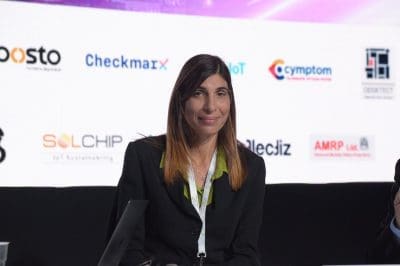This post is also available in:
 עברית (Hebrew)
עברית (Hebrew)
HR in Israel has become a huge problem in Israel. “In Israel, There Are 21,000 Openings and We Can’t Find People,” asserts Karin Mayer Rubinstein, CEO and Presicent, IATI during an intriguing panel discussion on manpower shortage at INNOTECH – the international cyber, HLS and innovation conference and exhibition organized by iHLS last week.

Opening the innovation session, Dr. Ron Malka, Director General, the Israeli Ministry of Economy and Industry, said: “In Israel, education progressed to innovation, necessity brings leadership in innovation. The military as a melting pot and our teamwork capabilities have also contributed to our global leadership in innovation.” He revealed that the shortage in skilled human resources is addressed by a strategic program, but in the meantime, Israel purchases services from abroad.
Ran Natanzon, Head of Innovation and Country Branding at the Israel Ministry of Foreign Affairs and the Chairman of the Innovation session, said: “It takes effort and time to turn the large ship – the State – to the right direction but it is slowly moving there, towards a better strategy.” He emphasized that “the public-private partnership within the ecosystem is the key to success. The government’s role is dealing with market failures, lowering the barriers to education and even bringing foreign talents from abroad, e.g. through the startup visa.”

Brig. Gen. (res.) Sharon Nir, former Commander of the IDF National School of Communication & Cyber Defense, points out 00the main problem, to her opinion: “There is no systemic and comprehensive solution for training people for evolving professions.

The actual training is currently carried out using the OJT method or by the technology companies themselves out of a desire to adapt the existing human resources to the changing reality. But in practice, this is an unprofessional and even lacking response.” She calls for thinking outside the box: “No more traditional linear thinking that the classical education system (school and academy) can provide a complete and holistic solution. It is necessary to create a dynamic ecosystem that includes the education system, academia, industry, the IDF. All of these work together in cooperation and concentration of continuous effort to train human resources for the cyber, software, information, and other professions.”
A real opportunity and consideration are required for sectors such as periphery residents, women, minorities, ultra-orthodox, etc.
“The right age to study computers is 9!” – claims Gabi Marom, CEO-Partner and Training Array Manager at Alice Code. The educational gap between boys and girls is evident, and her project tries to bridge it. The girls learn Stretch, Python, CSS. “As part of a collaboration with Cambridge and Harvard universities, the program encompasses some 1000 girls, who become engineers at the age of 16. They all continue to technological units in the IDF.”
Orit Tatarsky, Director, Cyber Skills and Growth Center at the Israel National Cyber Directorate, presented another project: Mamriot program of the Cyber Education Center is an example of a short-term solution: Orthodox girls that graduated the program already fulfill roles in the high-tech industry. INCD will also be a partner in a cyber school in Beer Sheva in the near future.




























